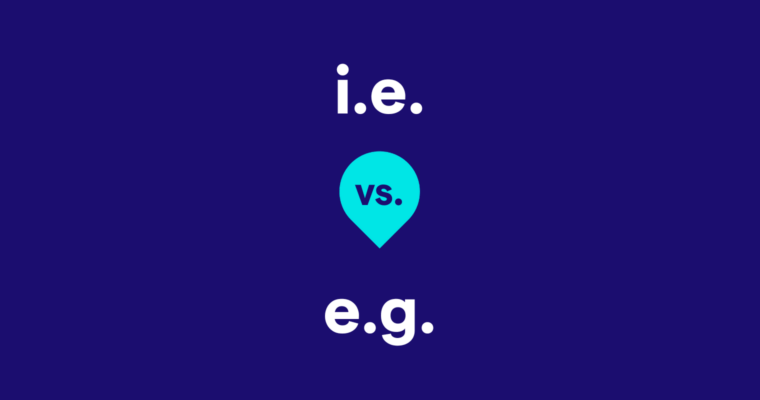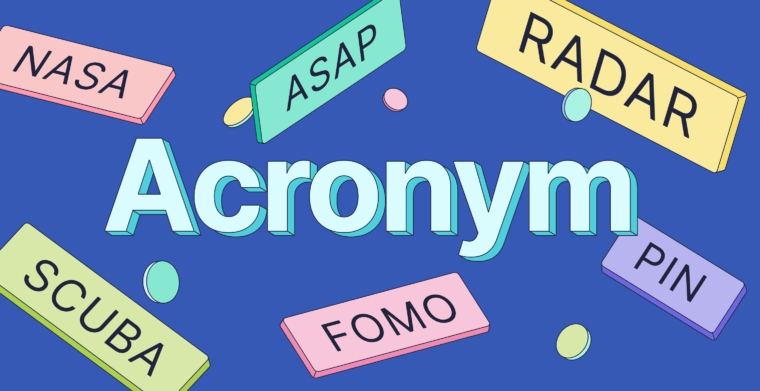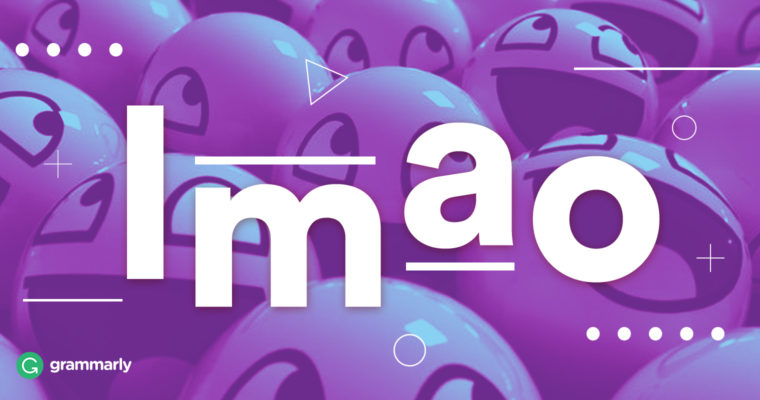
- I.e. stands for id est, or “that is,” and means “in other words”—use it to clarify the statement before it.
- E.g. stands for exempli gratia and means “for example”—use it to introduce examples and illustrate a statement.
- I.e. and e.g. are both Latin abbreviations.
Here’s an easy way to remember the difference:
- e is for example (e.g.)
- i and e are the first letters of “in essence,” an alternative English translation of i.e.
You’ve probably encountered i.e. and e.g. before, but you might not have known exactly what they mean. They’re both Latin abbreviations that predate modern English. So why do we use them in our writing today? If you’ve ever wondered about this or the difference between i.e. and e.g., read on.
Understanding how to use i.e. and e.g.
When you come across an unfamiliar abbreviation in a text, it can be confusing. Imagine getting a text message full of acronyms you’ve never seen before—you might find yourself googling those acronyms to figure out what your friend is talking about.
I.e. and e.g., two commonly confused phrases, can feel like that sometimes. The truth is, they’re very simple—and very useful for your writing. We’ve broken them down and showcased them with valuable examples to help you confidently add i.e. and e.g. to your writing toolkit. Read on to see i.e. and e.g. in action.
Table of contents
What’s the difference between i.e and e.g.?
How to use e.g. and i.e. (with examples)
What does i.e. mean?
I.e., or id est, essentially means “in other words.” It’s used to clarify an unfamiliar word or phrase that preceded it. Here’s a quick example:
Besides math and crossword puzzles, I am passionate about self-supported bicycle touring, i.e., traveling hundreds and thousands of miles on a bike with all my camping gear and other supplies.
—The New York Times
If you’re wondering how to use i.e. in your writing, remember that it can replace a phrase like “which is” or “in essence.” It’s often used as an appositive, a short detail included in a sentence between commas. Here’s an example of an appositive:
My friend’s hobby, woodworking, keeps him pretty busy.
We could remove the word woodworking, and the sentence still makes sense. That’s the key to i.e.—you could remove it and the clarification that follows without compromising its sentence’s meaning. Take a look at this example:
My family hosts increasingly high-stakes cooking competitions (i.e., increasingly more complex meals) every Thanksgiving.
We could simply write this sentence like this:
My family hosts increasingly high-stakes cooking competitions every Thanksgiving.
I.e. helps the reader understand what your writing means. While this is often because a word or phrase may be unfamiliar to them, sometimes it’s used for humorous or ironic effect. Take a look at this example:
As a writer, I’m continuously being chased by monsters (i.e., procrastination and writer’s block).
In this example, i.e. signals that the word monsters is being used figuratively to humorously personify their procrastination and writer’s block.
What does e.g. mean?
E.g.is an abbreviation of exempli gratia. In English, it means “for example.” It’s used to introduce one or more examples into a piece of writing. Here’s a look at e.g. in a sentence:
Should that happen to poor, as-yet unaffected places (e.g., most of South Asia and Africa), the suffering can be great.
—“WHO rejects calls to move Olympics over Zika fears,” Agence France-Presse
E.g. can be used in place of “for example.” You might choose to do this to keep your writing concise. When you use e.g., you typically don’t follow it with a long list of examples. One or two are perfectly fine.
What’s the difference between i.e and e.g.?
The difference between i.e. and e.g. is that i.e. adds context by defining a word or phrase, while e.g. provides one or more examples.
Here’s a look at them side by side:
I tried to take the short route home, but almost every road in town was closed (i.e., it took me longer than usual to get home).
I tried to take the short route home, but almost every road in town was closed (e.g., Main Street, Clinton Ave, and my block all had roadwork going on).
See how they communicate similar but distinct things? Both clarify the statement that precedes them, but while i.e. adds context, e.g. adds detail. Both are handy abbreviations to work into your writing
How to use e.g. and i.e. (with examples)
Use i.e. and e.g. when you want to clarify a word or statement with different phrasing or examples, respectively. Because they’re abbreviations, they don’t need to be italicized. However, if you were to use their full versions (i.e., id est and exempli gratia), they would need to be italicized because they’re not in English.
Unless it’s the first word of a sentence, i.e. and e.g. should be lowercase.
If you’re not sure whether to use i.e. or e.g., swap in synonymous phrases and see if the sentence still makes sense. Here’s an example:
I can’t remember the last weekend where I didn’t do at least a little bit of homework (i.e., this semester has been my busiest yet).
I can’t remember the last weekend where I didn’t do at least a little bit of homework—in other words, this has been my busiest semester yet.
They’re vegetarians, so make sure you’ve got some plant-based choices (e.g., lentil soup or tofu curry) on hand for when they visit.
They’re vegetarians, so make sure you’ve got some plant-based choices, for example, lentil soup or tofu curry, on hand for when they visit.
Most style guides require i.e. and e.g. to have a period after each letter, and they are both always followed by a comma. Take a look at another pair of examples:
My dogs are barking loudly; i.e., it’s difficult to have a conversation right now.
In-season produce is so delicious; e.g., there’s nothing like a slice of farm-fresh watermelon on a hot summer day.






